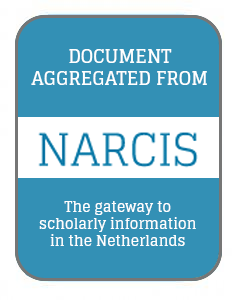Focal point
Location
National Academic Research and Collaborations Information System (NARCIS) is the main Dutch national portal for those looking for information about researchers and their work. NARCIS aggregates data from around 30 institutional repositories. Besides researchers, NARCIS is also used by students, journalists and people working in educational and government institutions as well as the business sector.
NARCIS provides access to scientific information, including (open access) publications from the repositories of all the Dutch universities, KNAW, NWO and a number of research institutes, datasets from some data archives as well as descriptions of research projects, researchers and research institutes.
This means that NARCIS cannot be used as an entry point to access complete overviews of publications of researchers (yet). However, there are more institutions that make all their scientific publications accessible via NARCIS. By doing so, it will become possible to create much more complete publication lists of researchers.
In 2004, the development of NARCIS started as a cooperation project of KNAW Research Information, NWO, VSNU and METIS, as part of the development of services within the DARE programme of SURFfoundation. This project resulted in the NARCIS portal, in which the DAREnet service was incorporated in January 2007. NARCIS has been part of DANS since 2011.
DANS - Data Archiving and Networked Services - is the Netherlands Institute for permanent access to digital research resources. DANS encourages researchers to make their digital research data and related outputs Findable, Accessible, Interoperable and Reusable.
Members:
Resources
Displaying 151 - 155 of 1863Analyses of Land Cover Change Trajectories Leading to Tropical Forest Loss: Illustrated for the West Kutai and Mahakam Ulu Districts, East Kalimantan, Indonesia
In Indonesia, land cover change for agriculture and mining is threatening tropical forests, biodiversity and ecosystem services. However, land cover change is highly dynamic and complex and varies over time and space. In this study, we combined Landsat-based land cover (change) mapping, pixel-to-pixel cross tabulations and expert knowledge to analyze land cover change and forest loss in the West Kutai and Mahakam Ulu districts in East Kalimantan from 1990-2009.
Meeting global land restoration and protection targets: What would the world look like in 2050?
Land restoration has received increased attention recently as a tool to counteract negative externalities of unsustainable land management on human well-being. This is reflected in targets of the Sustainable Development Goals (SDGs), the Convention on Biological Diversity (CBD), the United Nations Framework of the Convention on Climate Change (UNFCCC) and the United Nations Convention to Combat Desertification (UNCCD). However, the implications of these targets for land use, especially considering their potential conflict with growing food production demands, are largely unexplored.
A spatially explicit representation of conservation agriculture for application in global change studies
Conservation agriculture (CA) is widely promoted as a sustainable agricultural management strategy with the potential to alleviate some of the adverse effects of modern, industrial agriculture such as large-scale soil erosion, nutrient leaching and overexploitation of water resources. Moreover, agricultural land managed under CA is proposed to contribute to climate change mitigation and adaptation through reduced emission of greenhouse gases, increased solar radiation reflection, and the sustainable use of soil and water resources.
Analyses of Land Cover Change Trajectories Leading to Tropical Forest Loss: Illustrated for the West Kutai and Mahakam Ulu Districts, East Kalimantan, Indonesia
Representing large-scale land acquisitions in land use change scenarios for the Lao PDR
Agricultural large-scale land acquisition (LSLA) is a process that is currently not captured by land change models. We present a novel land change modeling approach that includes processes governing LSLAs and simulates their interactions with other land systems. LSLAs differ from other land change processes in two ways: (1) their changes affect hundreds to thousands of contiguous hectares at a time, far surpassing other land change processes, e.g., smallholder agriculture, and (2) as policymakers value LSLA as desirable or undesirable, their agency significantly affects LSLA occurrence.



